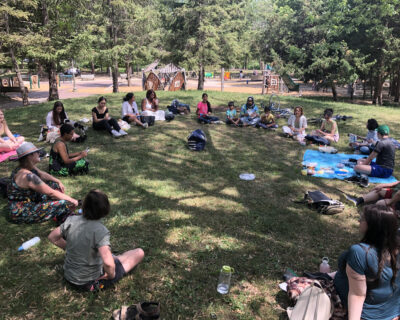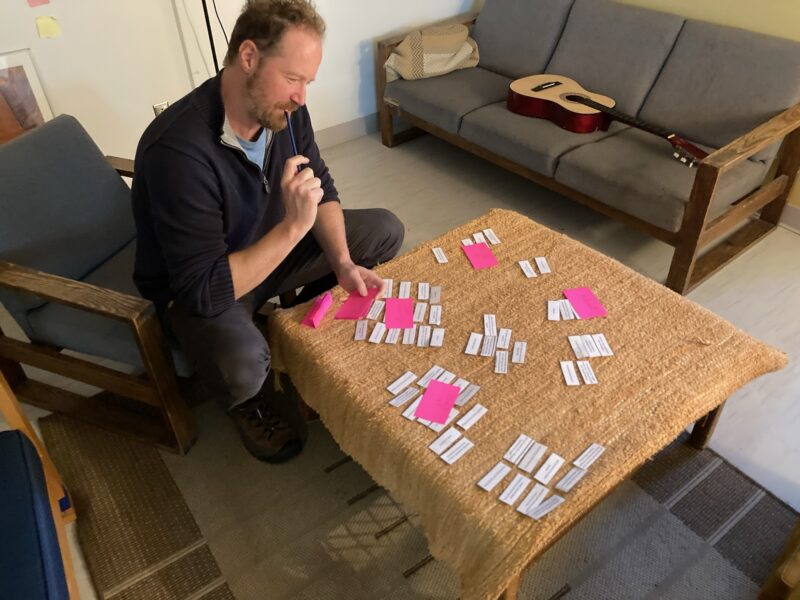#BecauseOfNewSchool
So, what’s going on at New School?
Through the eyes of Andrew Katz, New School’s newest coordinating English teacher.
Andrew has made New School up on the 8th floor a home for his dynamic and creative English classes for the last six years. Co-coordinators Cory Legassic and Mari Heywood interviewed Andrew on how New School has impacted his teaching career and involvement at Dawson.
A pedagogical pillar of New School is emerging curriculum. What does this look like in your teaching at New School?
“One of the clearest examples for me of emerging curriculum occurred during a course I was teaching in Children’s Literature. The first novel that we read together—one I had chosen—raised objections among some of the students in my class. We explored their objections together; based on their input I came up with a list of possible novels to read next; and then the class voted on their preferred book. Interestingly, after having been given room to express their points of view and the opportunity to select our next text, the students who had objected to the previous book re-evaluated their impressions, noticing nuances they had missed on first read. One challenge with emerging curriculum is the uncertainty of how students will respond to readings and where those responses might take the class. At the same time, the flexibility of an emerging curriculum can give students a meaningful say in what they are reading and help foster in them a personal connection to the material that leads to deeper learning.”
Another pillar of New School is the facilitation of learning versus (what Freire famously calls) the banking model of education. How has your teaching changed since being at New School?
“New School has made me more attuned to the impact of a student’s social, cultural, familial and personal background on their academic success. New School has persuaded me that the more room we can make in the classroom for each student as a whole person; the more we can encourage the student to make connections between themselves, their world and the curriculum, then the more engaged a student is likely to be in their studies. The way the school is organized and runs its classes have led to some of my most fulfilling experiences in my 20 years of teaching.”
We know at New School, students really appreciate the ways we also make ourselves vulnerable and show up as whole persons. What’s a practice you have built into your facilitation toolbox that normalizes caring and connection between everyone in the learning group?
“I begin every class with a “temperature check”—asking students to hold their thumbs up, sideways, down or somewhere in between, just to give me a sense of how they are doing that day or that week. Students know they can share, or not, why their thumb is pointing in the direction it is, and even if they say nothing, this check-in exercise hopefully communicates to them that I am aware of their well-being as we begin learning together. One busy week I forgot to do this particular check-in, and the students quickly reminded me. “Hey, you forgot to ask us about how we’re feeling!” they said, almost indignantly. Behind the poker faces our students sometimes present, there is often a real appreciation of a teacher expressing curiosity—even if only through a simple weathervane-like movement of their thumb—about what might be going on in their inner world.
Can you share a New School memory that really captures what makes New School special?
Several years ago, I had a very bright, creative student who took all four of her English classes with me through New School. Through the New School check-ins and self-to-subject discussions, it became clear that she was struggling mightily with various issues in her personal life—and, despite her obvious academic capacity, hanging on to school by the skin of her teeth. The softly-lit rooms and supportive community of New School seemed to appeal to her, though, and despite handing in most of her assignments late, she showed up and participated week after week. Fast forward a few years later: I received an email from her letting me know that she was thriving in her bachelor’s degree, and she proudly let me know that she was submitting all her work on time. She recognized the fitful period that her semesters at Dawson had been for her, and she credited New School for helping her to make it through. Some of her closest friends, she said, continued to be the ones she had made in New School. This past year, she began her master’s degree, and witnessing her success, especially knowing how far she’s come, has made me grateful for the special learning environment that New School creates for students who otherwise might have slipped through the cracks.




